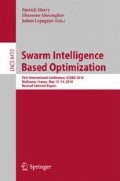Abstract
Swarming has become a management tool for letting individuals cooperate in order to generate emergent solutions to difficult issues in organizations. Beyond the buzzword, we claim that swarming actually matches specific project management practices having a great potential for improving project success. Swarming project management is defined, and the way it complements traditional and agile project management schemes is analysed. Metrics for evaluation of management practices are defined: required practices - practices that lead to failure if not implemented - success practices - practices that good teams put in place - and silver bullets - practices having a measurably significant impact on success. The analysis is performed through a controlled experiment involving 52 computer science students at the bachelor level, in the context of a 4 month development project involving 8 parallel teams working on the same software project.
Access this chapter
Tax calculation will be finalised at checkout
Purchases are for personal use only
Preview
Unable to display preview. Download preview PDF.
References
Ahsan, K., Gunawan, I.: Analysis of cost and schedule performance of international development projects. International Journal of Project Management 28(1), 68–78 (2010)
Chaos manifesto 2012 - the year of the executive sponsor. The Standish Group (2012)
Chaos manifesto 2013 - think big, act small. The Standish Group (2013)
Cockburn, A.: Crystal Clear: A Human-Powered Methodology for Small Teams: A Human-Powered Methodology for Small Teams (2004)
Chu, S.-C., Roddick, J.F., Pan, J.-S.: Parallel particle swarm optimization algorithm with communication strategies. submitted to IEEE Transactions on Evolutionary Computation (2003)
Jarboui, B., Damak, N., Siarry, P., Rebai, A.: A combinatorial particle swarm optimization for solving multi-mode resource-constrained project scheduling problems. Applied Mathematics and Computation 195(1), 299–308 (2008)
Kennedy, J., Eberhart, R., et al.: Particle swarm optimization. In: Proceedings of IEEE International Conference on Neural Networks, vol. 4(2), pp. 1942–1948. Perth, Australia (1995)
Millonas, M.M.: Swarms, phase transitions, and collective intelligence. In: Santa Fe Institute Studies in the Sciences of Complexity-Proceedings, vol. 17, pp. 417–417. ADDISON-WESLEY PUBLISHING CO (1994)
Van Dyke Parunak, H.: A Survey of Environments and Mechanisms for Human-Human Stigmergy. In: Weyns, D., Van Dyke Parunak, H., Michel, F. (eds.) E4MAS 2005. LNCS (LNAI), vol. 3830, pp. 163–186. Springer, Heidelberg (2006)
Passino, K.M., Seeley, T.D., Visscher, P.K.: Swarm cognition in honey bees. Behavioral Ecology and Sociobiology 62(3), 401–414 (2008)
Ramos, V., Fernandes, C., Rosa, A.C.: Social cognitive maps, swarm perception and distributed search on dynamic landscapes. arXiv preprint nlin/0502057 (2005)
Snowden, D.J., Boone, M.E.: A leader’s framework for decision making. Harvard Business Review 85(11), 68 (2007)
Takeuchi, H., Nonaka, I.: The new new product development game. Harvard Business Review 64(1), 137–146 (1986)
Trianni, Vito, Tuci, Elio: Swarm Cognition and Artificial Life. In: Kampis, George, Karsai, István, Szathmáry, Eörs (eds.) ECAL 2009, Part II. LNCS, vol. 5778, pp. 270–277. Springer, Heidelberg (2011)
Turner, S.J.: Termites as models of swarm cognition. Swarm Intelligence 5(1), 19–43 (2011)
Valigiani, G., Biojout, R., Jamont, Y., Lutton, E., Collet, P., et al.: Experimenting with a real-size man-hill to optimize pedagogical paths. In: Proceedings of the 2005 ACM Symposium on Applied Computing, pp. 4–8. ACM (2005)
Verheyen, G.: SCRUM a Pocket guide. Best Practice. Van Haren Publishing (April 2013)
Author information
Authors and Affiliations
Corresponding author
Editor information
Editors and Affiliations
Rights and permissions
Copyright information
© 2014 Springer International Publishing Switzerland
About this paper
Cite this paper
Parrend, P., Masai, P., Zanni-Merk, C., Collet, P. (2014). Swarm Projects: Beyond the Metaphor. In: Siarry, P., Idoumghar, L., Lepagnot, J. (eds) Swarm Intelligence Based Optimization. ICSIBO 2014. Lecture Notes in Computer Science(), vol 8472. Springer, Cham. https://doi.org/10.1007/978-3-319-12970-9_15
Download citation
DOI: https://doi.org/10.1007/978-3-319-12970-9_15
Published:
Publisher Name: Springer, Cham
Print ISBN: 978-3-319-12969-3
Online ISBN: 978-3-319-12970-9
eBook Packages: Computer ScienceComputer Science (R0)

